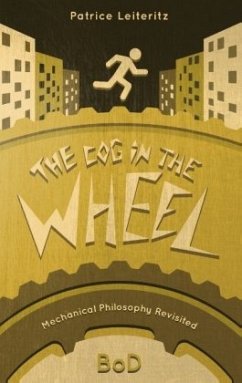The mechanical philosophy originates in the 18th century and is based on ideas that were already advocated by ancient philosophers. Instead of explaining the world with the help of gods and founding a whole value system based on the teachings of a religion, the followers of mechanical philosophy sought their answers in nature and its laws. For them, the universe was a gigantic and complex mechanism governed by the principle of cause and effect. They even extended this view onto human beings, seeing them as another product of nature and not as a divine creation. The free will, of whose existence we are all convinced, is questioned as well. What follows from this world view and what does it mean for us, for our society and our understanding of morality, guilt, good and evil? The book The Cog in The Wheel is conceived as a compact work that is intended to provide the reader with the most comprehensive insight possible into the fundamentals and conclusions of mechanical philosophy. The structure of the book is pragmatic and starts with an explanation of the terms materialism, determinism and the principle of causality. In the next chapter the far-reaching consequences of these propositions are presented and explained. Here, numerous topics are taken up which, under the premise of mechanical philosophy, must be reassessed. These include, for example, the concept of nature, the difference between animate and inanimate matter, the highest good for mankind, and considerations regarding the meaning of life. The book contains examples, usually following theoretical explanations, which present the preceding information in a comprehensible way. This should also give those readers an introduction to the subject who have never dealt with it before. The last chapter is a summary and serves the practical application of theoretical knowledge. This handbook is not primarily intended as a guide to life but is primarily designed to introduce the interested reader to a particular school of philosophy, from its foundations to its application.
Bitte wählen Sie Ihr Anliegen aus.
Rechnungen
Retourenschein anfordern
Bestellstatus
Storno

